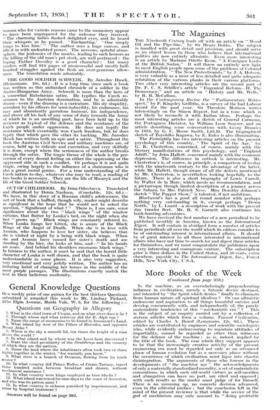THE GOOD SOLDIER SCHWEIK. By Jaroslav Hasek. (Heinemann. 10s. 6d.)—It
is a long time since such a book was written as this unfinished chronicle of a soldier in the Austro-Hungarian Army. Schweik is more than the hero of a somewhat Rabelaisian satire. He typifies the Czech re- sistance to the Austrian domination, and he is admirably drawn—even if the drawing is a caricature. His sly stupidity, mistaken by his officers for semi-imbecility, his endurance, his racy and abundantly garrulous humour, his independence, and above all his lack of any sense of duty towards the Army of which he is an unwilling part, have been held up to the reviewer as typical of the defence and the resistance of the Czech people under oppression. He does not typify the resistance which eventually won Czech freedom, but he does typify that which gave the other its backing. Mr. .laroslav Ilasek has written both an epic and a satire. Throughout the book the Austrian Civil Service and military machines are, of course, held up to ridicule and execration, and very skilfully it is done, except where the seriousness of the author breaks through the satire. The tragic theme of the whole is the per- version of every decent feeling on either the oppressing or the oppressed side in such a conflict. Or perhaps it is not quite tragic, owing largely to the influence of a statesman who is also a great moral genius. For a true understanding of the Czech nation to-day, whatever else may be read, a reading of two books is necessary. They are the life of Masaryk and the life of the Good Soldier Schvreik.










































 Previous page
Previous page